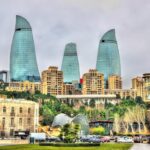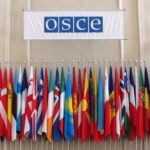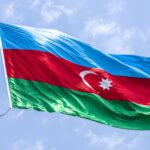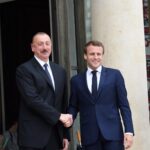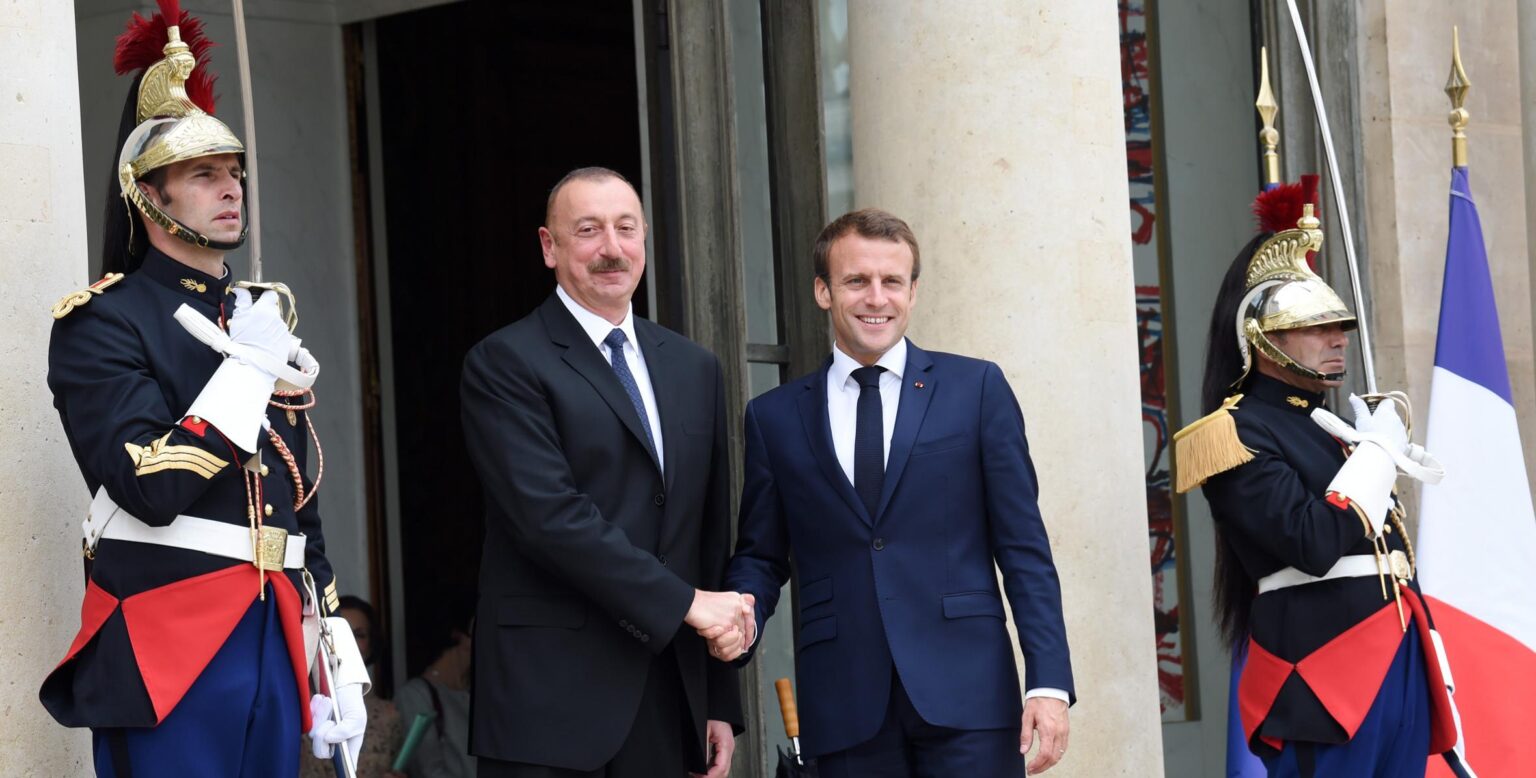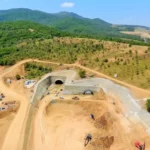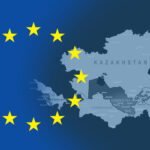Introduction
The diplomatic relationship between France and Azerbaijan traces its origins back to early 1992, a period marked by significant geopolitical shifts following the dissolution of the Soviet Union. France swiftly recognized Azerbaijan’s independence and established a diplomatic mission in Baku, positioning itself as one of the first Western nations to do so. This early recognition set the stage for a complex and multifaceted bilateral relationship, characterized by both cooperation and contention over the ensuing decades.
Throughout the 1990s, France’s role as a permanent member of the United Nations Security Council and its involvement in mediating the Nagorno-Karabakh conflict underscored its strategic interest in the South Caucasus. The relationship saw various phases of activity, with significant diplomatic efforts during the presidencies of Jacques Chirac and Nicolas Sarkozy, followed by renewed vigor under François Hollande and Emmanuel Macron. These efforts included high-level visits, defense cooperation, and economic partnerships, highlighting the mutual interests that have driven bilateral engagements.
However, the relationship has also been marked by periods of significant tension, particularly in the context of the ongoing conflict between Azerbaijan and Armenia. France’s involvement in peace negotiations, its diplomatic stances, and its actions during the Second Karabakh War have often put it at odds with Azerbaijan, leading to strained relations. Recent years have witnessed a series of diplomatic disputes, accusations, and contentious resolutions that have further complicated the relationship.
Despite these challenges, there is potential for normalization and cooperation. The evolving nature of international relations and the shared interests in regional stability, economic development, and cultural exchanges suggest that with thoughtful diplomacy and mutual respect, France and Azerbaijan can navigate their differences and work towards a more stable and productive partnership. This article delves into the historical trajectory, key milestones, and current dynamics of France-Azerbaijan relations, providing a comprehensive overview of the factors shaping their complex interaction.
1992-2020
France and Azerbaijan established their relations in January 1992 when France became one of the first countries to recognize Azerbaijan’s independence. On March 16, France opened its Embassy in Azerbaijan and Azerbaijan did the same on October 20.
The following year, when the active phase of the conflict between Azerbaijan and Armenia began, France, as a permanent member of the UN Security Council, supported four resolutions related to this conflict. In December 1993, President Heydar Aliyev made his first official overseas visit to France, emphasizing the importance of bilateral relations for Azerbaijan.
In 1997, France became a co-chair of the OSCE Minsk Group, which was established in 1992 to facilitate a peaceful resolution to the Nagorno-Karabakh conflict.
During the presidency of Jacques Chirac, from 1995 to 2007, France actively participated in mediation initiatives to resolve the conflict between Azerbaijan and Armenia. French diplomats discussed proposals with the conflicting parties based on the Lisbon principles and made initiatives for a peaceful settlement.
In January 2004, President Ilham Aliyev continued his father’s tradition and made his first official overseas visit to France. This event solidified the importance of bilateral relations and marked a new milestone in the diplomatic history between the countries.
In February 2006, a meeting between Azerbaijani President Ilham Aliyev and Armenian President Robert Kocharyan was held at the French Rambouillet Castle with active French mediation, but significant results were not achieved due to disagreements over the status of Nagorno-Karabakh and the Kelbajar region.
In 2007, the Heydar Aliyev Foundation allocated funds for the restoration of the interior of the Palace of Versailles, and in 2009 donated 40,000 euros for the restoration of stained glass windows in the Strasbourg Notre-Dame Cathedral.
Cultural ties also played an important role in the relations between the two countries. In 2013, at the initiative of the Heydar Aliyev Foundation, “Days of Azerbaijani Culture” were held in Cannes. In 2014, 2015 and 2017 the Days of Azerbaijani Culture were again held in Cannes, including exhibitions and concerts organized by the Heydar Aliyev Foundation.
However, under François Hollande, who became president in 2012, relations revived.
In 2014, Hollande visited Azerbaijan. During his visit, an agreement was reached on the SAMP/T air defense systems, and the Azersky satellite for Earth observation was handed over. Additionally, together with Ilham Aliyev, they participated in the Azerbaijani-French business forum held in Baku, which saw the participation of more than 200 representatives from various companies and government officials. Also, at the initiative of the presidents of Azerbaijan and France, the intention to open the Franco-Azerbaijani University (UFAZ) in Baku was announced.
Activity in mediation services in the Armenian-Azerbaijani conflict continued in October 2014, when, at the initiative of the French government, negotiations were held in Paris between the President of Azerbaijan Ilham Aliyev and the President of Armenia Serzh Sargsyan on the settlement of the Nagorno-Karabakh conflict.
In 2015, at the initiative of the Ministry of Economy and Industry of Azerbaijan, an Azerbaijani-French business meeting was organized as part of the visit of a delegation led by the Secretary of State for Regional Reforms under the Minister of Decentralization and Public Service, André Vallini.
Since September 2016, the Franco-Azerbaijani University (UFAZ) has been accepting students in four technical specialties: chemical engineering, computer science, geophysical engineering, and oil and gas engineering. The project included a consortium of French universities led by the University of Strasbourg (Unistra) and the Azerbaijan State University of Oil and Industry (ASUNP).
The Macron Era
With Emmanuel Macron’s rise to power in 2017, a new phase of diplomatic activity began. In February 2018, the French company MBDA planned to sell Azerbaijan SAMP/T and VL MICA air defense systems.
On July 20, 2018, Azerbaijani President Ilham Aliyev met with French President Emmanuel Macron in Paris. The meeting took place in a warm atmosphere, and several documents concerning various areas of cooperation were signed during the talks, strengthening bilateral ties.
In March 2019, Azerbaijan’s First Vice-President Mehriban Aliyeva met with French Prime Minister Édouard Philippe. This visit marked the conclusion of important agreements. Among them was a convention for the reconstruction of the Sumgait-Yalama railway line as part of the North-South transport corridor development program, a strategic cooperation agreement between the Central Bank of Azerbaijan and Rothschild & Cie, and an agreement to create an operational control center and implement signaling and telecommunications systems for the Khojasan depot between Baku Metro CJSC and Thales International.
In July of the same year, Azerbaijani President Ilham Aliyev met with French Minister of Economy and Finance Bruno Le Maire in Baku. The meeting discussed prospects for cooperation in areas such as ecology, infrastructure, transport, and the oil and gas sector.
In June 2019, Counsellor to the Minister of Defence Industry of Azerbaijan, Farrukh Vezirov, participated in the Paris Air Show, organized under the patronage of the French Aerospace Industries Association. During the exhibition, Counsellor Vezirov met with the heads of French companies Nexter, Thales, CS Group, Lacroix, and the Turkish company TAI. Issues of bilateral cooperation in the military-technical sphere were discussed at these meetings.
Overall, in 2019, trade volume between the countries increased by 53% in the first five months of the year. SOCAR and the French oil company Total continued their cooperation in exploration and development projects of the Umid and Babek offshore fields.
In March, the bank Rothschild & Cie, part of the famous Rothschild financial empire, signed a strategic agreement with the Central Bank of Azerbaijan, committing to provide strategic advice in the banking sector.
2020-Present
January 2020 was marked by the official visit of Hikmet Hajiyev, Assistant to the President of Azerbaijan and Head of the Foreign Policy Department of the Presidential Administration, to France. Important topics such as the Nagorno-Karabakh conflict, Franco-Azerbaijani relations, regional issues, as well as energy and reform issues were discussed. In May, a joint webinar was held, organized by the Azerbaijan Export and Investment Promotion Foundation (AZPROMO), the French business organization (MEDEF), and the Azerbaijan-France Chamber of Commerce and Industry.
With the start of the Second Karabakh War in September 2020, relations between the countries became strained. President Macron made sharp accusations against Azerbaijan, claiming the country started the war and brought in mercenaries from Syria. Azerbaijan called on France to provide evidence of these accusations or apologize. In October, the first humanitarian ceasefire was reached, and President Ilham Aliyev stated that Macron promised to maintain France’s neutrality in the conflict, temporarily ending the diplomatic crisis.
However, on November 25, the French Senate adopted a resolution calling for the recognition of the “Republic of Artsakh.” The French government rejected this call, but the fact that the Senate passed the resolution indicated a certain level of support within the French government. During the Second Karabakh War, France supported an anti-Azerbaijani initiative in the UN Security Council, but this initiative was blocked by seven member states of the Non-Aligned Movement: the Dominican Republic, Indonesia, Niger, Saint Vincent and the Grenadines, South Africa, Tunisia, and Vietnam.
On November 10, a trilateral statement on a ceasefire was signed under Russia’s mediation. France welcomed the ceasefire but expressed concern about the need for a detailed explanation of the agreement’s terms. In November, the French Foreign Ministry expressed deep concern over the advancement of hostilities towards the city of Shusha. On November 25, the French Senate almost unanimously passed a resolution recognizing the “Republic of Nagorno-Karabakh.” On December 3, the French National Assembly adopted a resolution “On the Protection of Christian Communities in Europe and the East and the Armenian People.”
In December, President Macron met with representatives of the Armenian diaspora in France and expressed dissatisfaction that Armenian Prime Minister Nikol Pashinyan did not inform him of the content of the trilateral agreement.
On February 22, 2021, Foreign Minister Jeyhun Bayramov received a delegation of members of the French National Assembly. During the meeting, Minister Jeyhun Bayramov greeted the members of the National Assembly and spoke about the development of bilateral cooperation. He noted that Azerbaijan has always attached great importance to the development of relations with France. It was noted that France has always been active in the region and relations are developing in all directions through mutual understanding and dialogue.
In May 2021, amid ceasefire violations on the Azerbaijani-Armenian border, France called on the parties to observe the ceasefire and expressed support for Armenia’s territorial integrity. In June, the French Ambassador to Azerbaijan, Zacharie Gross, refused to participate in a diplomatic visit to the city of Shusha, which was perceived as a sign of disagreement with Azerbaijan’s position. However, he visited liberated territories such as Sugovushan and Talish. France unofficially presented an anti-Azerbaijani resolution draft to the UN Security Council, but work on this proposal was suspended and did not advance further. In September, Ambassador Zacharie Gross visited liberated Aghdam and expressed readiness for French companies to help in its reconstruction.
In November 2021, amid clashes on the Azerbaijani-Armenian border, France issued a neutral statement that did not accuse Azerbaijan. In December, at the Eastern Partnership summit in Brussels, President Macron met with Azerbaijani President Ilham Aliyev and Armenian Prime Minister Nikol Pashinyan, marking the beginning of a new stage in relations.
In January 2022, President Ilham Aliyev stated that France realized its mistakes and was trying to normalize relations with Azerbaijan.
February 2022 was eventful. On February 4, an online meeting of the heads of state of Azerbaijan, Armenia, France, and the European Union took place. As a result of the meeting, Azerbaijan released eight Armenian soldiers, and Armenia committed to providing information on missing Azerbaijanis.
On May, the Paris Mayor Anne Hidalgo expressed support for “Artsakh” and Armenia.
On September 13, at Armenia’s request and with direct participation from France, the UN Security Council held open discussions on Azerbaijan-Armenia relations. France initiated the adoption of a statement on behalf of the Security Council, but this did not succeed. In September, radical Armenian groups attacked the Azerbaijani embassy in Paris, causing damage to the building. French police did not intervene, which is a violation of the 1961 Vienna Convention on Diplomatic Relations.
From October 21 to 27, at the request of the Armenian government and with strong support from France, the OSCE sent a needs assessment group to Armenia. This mission was not adopted by a collective OSCE decision, did not have an OSCE mandate, and was funded by individual participating states.
On November 15, the French Senate adopted a resolution calling for sanctions against Azerbaijan, demanding its immediate withdrawal from Armenian territory and adherence to the November 9, 2020, ceasefire agreement. On November 19-20, at the International Organization of La Francophonie summit in Tunisia, France and Armenia actively participated in including anti-Azerbaijani provisions in the Djerba Declaration and the draft resolutions on crisis situations in Francophone territories.
On December 20, the UN Security Council held open discussions in response to Armenia’s official request to “close” the Lachin Corridor. Despite France’s efforts, which included presenting a document draft updated four times, consensus was not reached.
In February 2023, the mandate of the EU mission on the Armenia-Azerbaijan border was extended for two years under France’s leadership without Azerbaijan’s consent. In April, the French Foreign Minister announced the establishment of a “defense mission” at the French Embassy in Yerevan. In July-August, a proposal arose to convene a Security Council meeting to discuss the Lachin Road issue and adopt a document. The Security Council’s open meeting took place on August 16, but consensus was not reached. On September 21, the Security Council held a meeting at Armenia’s official request with France’s direct participation to discuss Azerbaijan’s counter-terrorism measures. Despite intensive efforts, no document criticizing Azerbaijan was adopted.
In October, the Paris City Council issued a letter of intent to grant honorary citizenship to “the Armenians of Nagorno-Karabakh.” On October 11, France presented a draft resolution to the UN Security Council on the Armenia-Azerbaijan issue, but the initiative did not gain support. In October, France was one of the main countries promoting a joint statement against Azerbaijan issued by the UN Human Rights Council, and its delegate read the declaration.
At the end of October, the Armenian Defense Minister visited Paris, where contracts were signed for the purchase of three GM200 radar systems from Thales and night vision devices from Safran. A memorandum of intent to strengthen cooperation with the French Armed Forces Ministry in air defense was also signed.
In November 2023, at the meeting of the European Regional Group of the Parliamentary Assembly of La Francophonie in Athens, a declaration against Azerbaijan was adopted at the initiative of France and Armenia. On November 13, at the EU Foreign Ministers’ meeting, a decision was made to explore the possibility of providing Armenia with non-lethal aid within the European Peace Facility (EPF). The EU-Azerbaijan Cooperation Committee meeting scheduled for November 13 was canceled at France’s request with support from Greece and Cyprus. On December 11, at the EU Foreign Ministers’ meeting, a decision was made at France’s proposal to increase the EU mission’s personnel in Armenia from 138 to 209 people.
In December, France had already delivered 50 Bastion armored vehicles to Armenia, with another 26 expected to be sent. The vandalization of the statue of Azerbaijani poetess Khurshidbanu Natavan in Evian, France, where red paint was poured on the statue and the nose was damaged, significantly worsened bilateral relations, as French authorities did not take any measures to restore the statue despite repeated diplomatic requests from Azerbaijan.
In January 2024, the French Senate adopted a resolution condemning Azerbaijan’s military actions in Karabakh and calling for sanctions. In February, the French Armed Forces Minister visited Armenia. During the visit, agreements were signed for the purchase of sniper rifles and the establishment of a partnership between the Saint-Cyr military academy and the Armenian military academy. In February, French instructors from the elite Alpine Hunters unit conducted training for Armenian servicemen at the Armavir training center in Armenia. The French Armed Forces Minister observed these trainings during his visit.
In March, the French National Assembly adopted a resolution condemning the ethnic cleansing of the Armenian population of Nagorno-Karabakh by Azerbaijan and demanding respect for Armenia’s territorial integrity.
In April, the French Senate had a draft European resolution on the agenda for financing aid to Armenia.
In May, the French Interior Minister Gérald Darmanin accused Azerbaijan of “interference” in the unrest in New Caledonia. The Ministry of Foreign Affairs of Azerbaijan responded sharply to these accusations: “We completely reject the latest statement made by French Interior Minister Gérald Darmanin against Azerbaijan and the alleged links between Azerbaijan and the leaders of the New Caledonia independence movement, as stated in his interview with France-2 on May 16, 2024.
First and foremost, we once again strongly condemn the offensive remarks made by the French side towards Azerbaijan and call for an end to the slanderous campaign against Azerbaijan with unacceptable accusations such as the mass killing of Armenians.
It would be more appropriate for the French Interior Minister to recall the history of his own country, which committed crimes against humanity against indigenous peoples and the brutal killings of millions of innocent people as part of its colonial policy conducted over many years.
Moreover, instead of accusing Azerbaijan of allegedly supporting independence protests in New Caledonia, the French Interior Minister should focus on his country’s failed policies regarding overseas territories, which have led to such protests.
We once again call on France to cease its baseless accusations against our country.”
Conclusion
Geopolitics expert Shujaat Ahmadzade from Baku, in his article on Franco-Azerbaijani relations, expresses numerous grievances against France, focusing his discontent on several key aspects. In his view, after the Second Karabakh War, France became “irritated” by the new reality in the region. The signing of the trilateral ceasefire agreement brokered by Russia effectively sidelined the OSCE Minsk Group, significantly undermining France’s regional role. As a result, France opposes Azerbaijan’s geopolitical projects, such as the “Zangezur Corridor,” and continually incites Armenia to take unreasonable actions.
According to the author, French policy towards Azerbaijan is often declarative. He cites the frequent calls by the Senate to recognize the independence of Nagorno-Karabakh, which had no real consequences, and discussions of military cooperation with Armenia, which turned out to be merely formal. Additionally, the French ambassador’s refusal to visit Shusha demonstrates official Paris’s dissatisfaction with Azerbaijan’s position.
Historical examples provided in the article also highlight the bias and corruption of French diplomats. In 1993, Jean-Bernard Mérimée objected to mentioning Armenia in a UN Security Council resolution despite its role in the occupation. In 2008, Bernard Kouchner threatened to recognize the independence of Nagorno-Karabakh if Azerbaijan did not reach an agreement with Armenia.
The author also points out the racist and imperialist undertones in French politicians’ actions. An example of this is Macron’s remark that “Napoleon is a part of us,” reflecting deep-seated prejudices and stereotypes.
French diplomacy is criticized by the author for its inability to adapt to the new political configuration created after the Second Karabakh War. The author’s dissatisfaction is also tied to France’s lack of a constructive approach to cooperation with Azerbaijan. The main grievance is the lack of respectful treatment towards Azerbaijan and its people.
All these factors create tension in Franco-Azerbaijani relations, which had been developing positively before the Second Karabakh War. The author emphasizes that the current situation in bilateral relations reduces Azerbaijan’s ability to make independent decisions and increases the risks of unilateral actions by France.
Today, diplomatic relations between France and Azerbaijan indeed experience a complex and fluctuating history, marked by periods of cooperation and disagreement. In the modern context, these relations have reached an unprecedented low. A thorough analysis shows that Azerbaijan cannot be considered the sole culprit for this deterioration. On the contrary, it is primarily due to France’s excessive ambitions and a series of strategic miscalculations that have contributed to the current tense state of affairs.
France’s foreign policy decisions, driven by a desire to extend its influence and assert its presence in the region, have often clashed with Azerbaijan’s national interests and sovereignty. These actions have not only strained bilateral ties but have also undermined mutual trust and cooperation. Missteps in diplomatic engagements, coupled with a lack of sensitivity towards the geopolitical realities of the South Caucasus, have further exacerbated tensions.
Despite these challenges, there remains a glimmer of hope for the normalization of relations between the two nations. The dynamic nature of international relations means that today’s adversarial stance can evolve into tomorrow’s partnership. Both countries stand to benefit from a pragmatic approach that emphasizes dialogue, mutual respect, and a willingness to address contentious issues constructively.
Rebuilding trust will require concerted efforts from both sides, including transparent communication, diplomatic engagement at various levels, and a recognition of each nation’s legitimate concerns and aspirations. By fostering a climate of cooperation and understanding, France and Azerbaijan can work towards reestablishing a more stable and productive relationship.


